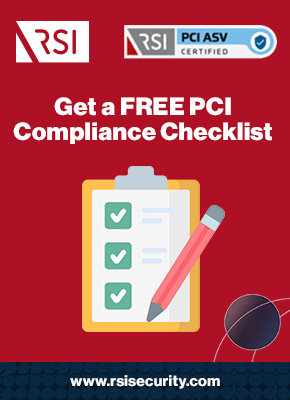Compliance with the PCI DSS framework is crucial to keeping cardholder data (CHD) safe from security threats. Outsourcing PCI compliance management will help your organization to comply with the PCI DSS Requirements year-round. Read on to learn about the benefits of partnering with a PCI compliance services provider.
Why Should You Outsource PCI Compliance Management?
Regardless of your organization’s current security posture, the PCI DSS requires you to keep cardholder data safe during all stages of its processing. Outsourcing your PCI compliance management is an effective way to remain up-to-date with PCI security standards, even as cybersecurity risks evolve. To establish why, this blog will explore:
- An overview of the PCI DSS v4.0 framework
- The benefits of outsourcing PCI compliance management
- Considerations for outsourcing PCI compliance management
Partnering with an experienced PCI compliance specialist will help you implement data security best practices across your organization and meet applicable PCI compliance requirements.
What is the PCI DSS?
The Payment Card Industry (PCI) Data Security Standards (DSS) framework was established to help organizations secure cardholder data during its collection, processing, storage, or disposal. Compliance with the PCI DSS Requirements enables these organizations to implement internationally recognized best practices to secure data from cybersecurity threats.
Considering the lucrative value placed on CHD and sensitive authentication data (SAD), organizations that handle these sensitive data must comply with the PCI compliance requirements to minimize data security risks. Card payment transactions are constantly at risk for cyberattacks and data breaches if merchants and other organizations that handle these payments do not implement adequate safeguards. That’s where the PCI DSS comes in.
Breakdown of the 12 PCI DSS Requirements
The most current version of the PCI DSS, v4.0, comprises 12 PCI compliance requirements whose guidelines secure sensitive PCI data, minimize security vulnerabilities, and strengthen data security oversight. Broken down, these 12 Requirements include:
- Requirement 1 – Establish network security controls
- Requirement 2 – Configure secure system components
- Requirement 3 – Safeguard stored account data
- Requirement 4 – Keep CHD safe during transmission over open, public networks
- Requirement 5 – Secure systems from malicious software (malware)
- Requirement 6 – Establish secure systems and software
- Requirement 7 – Limit access to sensitive data environments by business need to know
- Requirement 8 – Identify and authenticate user access to sensitive data environments
- Requirement 9 – Implement physical access controls to CHD
- Requirement 10 – Develop access logging and monitoring controls for sensitive data
- Requirement 11 – Implement routine network and system testing
- Requirement 12 – Establish information security policies and programs
Depending on your organization’s CHD environment (CDE) and infrastructure (i.e., components, people, and processes), you may be required to comply with several or all of the PCI DSS Requirements. Handling sensitive CHD out of scope for the PCI DSS Requirements will most likely put your organization at risk for cyberattacks and data breaches.
And with the help of a PCI compliance partner, you will be well-positioned to adhere to the PCI compliance guidelines in the short and long term.
Assess your PCI compliance
Benefits of Outsourced PCI Compliance Management
Whether you are new to PCI compliance or have significant experience with the DSS framework, it can still be challenging to remain fully compliant with the PCI DSS guidelines year-round. As card payment technologies evolve and data security risks broaden, your organization will likely require external guidance on implementing PCI compliance best practices.
Outsourcing PCI compliance management will help relieve your internal team from common challenges organizations typically encounter along the compliance journey.
Let’s dive into some of these benefits:

1. Faster Segmentation of In-Scope and Out-of-Scope Components
As your organization handles CHD or SAD, it helps to know which system components are in-scope or out-of-scope for PCI DSS to ensure you meet the PCI compliance requirements.
Components in scope for the PCI DSS are those found within sensitive CDE or connected to these environments. On the other hand, out-of-scope components are not located within or connected to PCI CDE. However, some out-of-scope systems may be connected to CDE but with restricting controls to prevent access to in-scope components.
Depending on the type of sensitive CHD or SAD your organization processes, it may be challenging to effectively distinguish between components in scope and those outside of it.
Working with a PCI compliance management services provider will help you conduct a system-wide inventory of components such as:
- Payment processing systems (e.g., payment terminals, gateways, storefront systems)
- Security systems (e.g., authentication servers, security information and event management (SIEM) systems)
- Segmentation systems (e.g., network security controls (NSCs))
- Virtualization components (e.g., virtual appliances, switches, routers)
- Applications and software components
- Network components (e.g., routers, wireless access points)
An ongoing system inventory will help determine which components are in-scope or out-of-scope for PCI DSS. And a PCI compliance advisor’s guidance will streamline the segmentation of components out-of-scope for PCI DSS from those in scope, minimizing risks to sensitive CDE.
2. Optimized PCI Compliance Change Management
As your organization grows, you will likely experience gradual changes in system processes and sensitive data environments. If these changes are poorly managed, CDE may be continuously exposed to risks, which could develop into actual threats that impact data sensitivity.
For5 example, PCI DSS Requirement 6 mandates keeping your systems and software secure, especially where vulnerabilities are concerned. To keep CHD and SAD safe at all times, the guidelines pertaining to PCI compliance change management must be developed and overseen by an existing security policy.
Partnering with a PCI compliance specialist will help you manage changes related to:
- Adding, removing, or modifying system components within CDE
- Planning and processing system changes
- Engaging stakeholders around best practices for implementing system changes
- Maintaining robust and reliable security controls during process changes
Outsourcing PCI compliance change management will help streamline vulnerability management and lower the overall risk of cyberattacks. With the guidance of a PCI compliance partner, your organization will be well-equipped to handle changes that could negatively impact sensitive data security.
3. Robust Security Testing and Vulnerability Assessments
Per PCI DSS Requirement 11, organizations that handle CHD and SAD must regularly test their security systems to identify potential vulnerabilities and risks to these data. Whereas your organization can implement various security testing methods, some may not be as effective or robust as others.
Outsourcing PCI compliance management to an experienced PCI DSS compliance partner will help you identify the most appropriate security testing tools, methods, and processes to keep CHD and SAD safe in the long term. When identifying and addressing security vulnerabilities, PCI compliance management will help you conduct internal and external vulnerability scans at the appropriate frequency.
For instance, PCI DSS Requirement 11.3 mandates that internal vulnerability scans be conducted:
- At least once every three months
- To resolve high-risk and critical vulnerabilities
- Using up-to-date vulnerability scan tools
- Based on the latest vulnerability information
However, your organization’s unique security posture may require more frequent scans. And, looking internally, you may not have immediate access to the most up-to-date vulnerability scan tools or the latest security information. Working with an Approved Scanning Vendor (ASV) on implementing security testing and vulnerability assessments will help you adhere to the PCI compliance guidelines as best as you can—keeping your CHD and SAD safe in the long term.
Likewise, the PCI DSS penetration testing requirements stipulate performing these tests internally at least once every 12 months. Penetration testing must also be conducted after significant changes to PCI infrastructure or applications, especially if they might impact sensitive data security.
Considering how crucial penetration testing is to identify high-risk vulnerabilities early on, the PCI DSS recommends a qualified internal resource or external third-party conduct the pen tests. These tests are likely to be more effective and identify more vulnerabilities if the pentester is independent of the organization being tested.

4. Guidance on Developing a PCI Security Policy
Even the most robust security systems and infrastructure can fail with poor oversight. That’s where a PCI security policy comes in.
PCI compliance becomes much easier for your organization to achieve if your existing security policy is established with the guidance of a PCI compliance management partner. This policy determines how the guidelines developed by your organization’s executive leadership are implemented at the grassroots level.
As technologies evolve across the assets you use to collect, process, store, or dispose of CHD, an established policy will help all employees align on best practices for managing these technologies.
For instance, a PCI compliance partner will help you draft policy guidelines with simple “dos” and “don’ts” for processing sensitive PCI data. These acceptable use policies will then be deployed across all types of technologies that handle sensitive data (e.g., laptops, tablets, mobile devices, wireless access endpoints).
Developing a PCI security policy in partnership with a PCI compliance advisor will also help keep internal and external stakeholders across your organization more accountable for compliance with the DSS guidelines.
Upon deciding the specific responsibilities for the different roles across your business, a PCI compliance partner can help you identify which organizational structures might be more useful in the long term.
Your PCI compliance advisor has most likely worked with multiple organizations and can easily define the most effective paths to becoming and remaining compliant with the DSS guidelines.
5. Preparation for PCI Compliance Reporting
The PCI DSS framework also requires organizations to report on how they achieved PCI compliance each year. PCI compliance reporting is based on the PCI levels, which are determined by individual Security Standards Council (SSC) Members.
Depending on your PCI Level, you may be required to report PCI compliance using one or more of three types of reports:
- Self-Assessment Questionnaire (SAQ) – The SAQ helps merchants to self-evaluate their compliance with the PCI DSS Requirements. Completing the SAQ involves answering a set of “yes” or “no” questions and submitting these responses along with an Attestation of Compliance (AoC).
- Report on Compliance (RoC) – Completing the RoC also evaluates an organization’s compliance with the PCI DSS Requirements, especially if it handles large amounts of card payment transactions annually. The RoC is typically completed by a Qualified Security Assessor (QSA) following a successful on-site audit of an organization’s PCI compliance.
- Attestation of Compliance (AOC) – Like the RoC, the AoC demonstrates that an organization has successfully complied with applicable PCI DSS Requirements. It is completed with the help of an SSC-certified QSA, who must verify and attest to an organization’s PCI compliance.
Considering the various nuances interspersed across the SAQ, RoC, and AoC, your organization will be better off partnering with an experienced PCI compliance specialist to accurately complete these reporting documents on your way to full DSS compliance.
Besides providing guidance on PCI compliance best practices, PCI compliance management partners like RSI Security also offer QSA and ASV services, ensuring your organization is well-equipped to keep CHD and SAD secure in the long term. As your organization grows, outsourcing PCI compliance management to a reputable PCI DSS partner will enable you to focus on streamlining the day-to-day activities without worrying about data security risks.
Failure to comply with the PCI DSS Requirements applicable to your organization’s data processing activities could increase the risk of cyberattacks, data breaches to CHD and SAD—and the legal, financial, and reputational consequences thereof.
Considerations for Outsourcing PCI Compliance Management
When outsourcing PCI compliance management, you should also keep in mind that your organization will likely benefit most from these services if your internal team works hand-in-hand with your compliance partner. Senior-level staff, such as the Chief Information Security Officer (CISO), and junior staff, such as help desk personnel, must be willing to share the appropriate amount of information requested, provide access to data environments, or optimize existing controls. However, your PCI compliance management partner should be able to meet your compliance needs and pose minimal risk to data security and your broader organization.
Learn More About PCI Compliance Management
Partnering with an experienced PCI compliance specialist is the most effective way to outsource PCI compliance management. RSI Security has worked with countless organizations to help them get started on implementing sustainable PCI compliance infrastructure year-round.
Contact RSI Security today to learn more and get started!
Download Free PCI Compliance Checklist
 |

2 comments
In today’s dynamic corporate context, compliance is critical. Companies across industries face a slew of laws and requirements that must be strictly followed. As someone who has personally encountered the challenges of compliance, I understand the importance of compliant management services.
Compliance management services guide firms through the complex web of laws and regulations. These services offer a holistic solution that goes beyond simple compliance; they take a proactive approach to detecting, addressing, and minimizing risks. It’s like having a dedicated comrade in the pursuit of regulatory excellence.